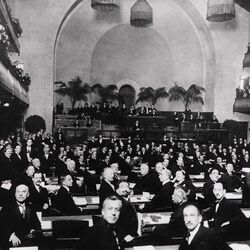December 19, 1918.
My dear Miss Addams: --
Please do not conclude, from my failure to write you before, that I have not been considering the matter you discussed with me Sunday. I have had a letter from Mr. Hapgood, and I have an appointment with Mr. Levinson tomorrow morning. I am writing Mr. Hapgood to the effect that I think his organization is a step ahead of Mr. Taft's, and that I regard "equality of economic opportunity" as altogether sound and desirable. It will probably be found to be "indispensable" in the evolution of a League of Free Nations. I am not so sure that it is an indispensable preliminary to the organization of such a league. We may be able to make a very substantial start if we confine it to the principles of the League to Enforce Peace, although I believe that, once established, such a league will find [the] "equality of economic opportunity" indispensable to its growth and permanence. I am more doubtful about the wisdom of insisting now upon direct minority representation in the Central Council or parliament of Mr. Hapgood's League of Free Nations. If the nations who belong to such a league are themselves free and democratic it may be wiser to leave to each of them the working out of the problem of minority representation [page 2] with its own delegation. I, for one, would certainly not wish to reject a League of Free Nations at this time merely because it did not immediately provide for direct minority representation, and I am afraid that that will be regarded as the purpose and effect of the language used in Mr. Hapgood's "Statement of Principles."
It seems to me we are all in real danger of dividing our forces over non-essentials, when we ought to be united in the creation of public sentiment in support of the common purpose. As you will have discovered if you have found time to read my address on A League to Enforce Peace, I believe in doing today what can now be done, and in not insisting upon things which, however desirable, may not be possible until tomorrow. I think international progress will be along evolutionary lines, much like those which have been followed in national and domestic progress. We go forward step by step. Occasionally we take a big jump. I think we can take a big jump now. I want it to be as big as possible, but I do not want to say that if it cannot be as big as I hope for it should not be taken at all. In other words, a big jump may be really desirable, but not "indispensable." That is what seems to me to be the trouble with Mr. Levinson's proposal to abolish war immediately and out of hand. The way to abolish war seems to me to be to set up another method of settling disputes, and to establish conditions that will reduce the causes of disputes. However, [page 3] Mr. Levinson is coming in to see me tomorrow, and he may change my opinion of his proposal. At present it looks to me much like a counsel of perfection.
The newspapers announce this morning that Mr. Taft, President Lowell and Mr. Walsh are to address a public meeting here in February. Is it not possible to unite our forces somehow? What I fear is lending color to the claim that the advocates of a League of Nations are so divided about the things that are indispensable even to the commencement of such a league, that its organization as a part of the Treaty of Peace is premature. I am sure it is not premature, but the more we emphasize non-essentials the more we justify the charge.
Sincerely yours,
Walter L Fisher [signed]


















Comments